To say that the hosts and listeners of Rebel Force Radio are enthusiastic fans of Star Wars is a bit like saying that Luke Skywalker and Darth Vader had a troubled father-son relationship.
The podcast, hosted by Jason Swank and James "Jimmy Mac" McInerney, began earlier this year as a forum for debate and discussion over every aspect of the gigantic futuristic universe created by George Lucas in his classic space opera movies.
Last week the Rebel Force Radio show opened with McInerney urging listeners to write to Bob Iger – the boss of Disney who bought the Star Wars franchise from Lucas last year – and deluge his offices with thousands of outraged letters. But the subject of McInerney's ire was not Disney's coming plans for a fresh Star Wars movie trilogy, which has set fans' hearts aflutter across the world; it was the possible cancellation of the far less well known Star Wars television cartoon series The Clone Wars.
"I am panicking right now. This is the time to panic," McInerney said in the sort of angry voice usually employed by political "shock jocks" such as Rush Limbaugh. "Fans should speak up now to let Disney know that we care about The Clone Wars. We have to let them know now as they are deciding the fate of the show."
That sort of intense passion over one aspect of Star Wars is both the curse and the blessing of Lucas's creation. The original three movies – and the later trilogy of prequels – now run alongside an ecosystem of novels, TV shows, blogs and fan fiction that has perhaps the most enthusiastic and knowledgeable fanbase of any intellectual property in the world. So when Disney announced a new set of films – and hints emerged last week that the actors who played Skywalker, Han Solo and Princess Leia would be returning – there was a vast outpouring of emotion and interest across the world.
The task of making the new films into a success will not be easy. As Rebel Force Radio proves, fans will parse every single decision and dribble of news that they come across. Pleasing such a group of people is crucial to any project's success, but also virtually impossible. "There is a hardcore fan base out there," said Wheeler Winston Dixon, a critic and film expert at the University of Nebraska.
Hollywood history is littered with disastrous sequels that have sullied the memory of the original works they followed. When Steven Spielberg returned an ageing cast to his Indiana Jones movie series, the result was a film roundly panned by critics and fans alike. The science fiction film The Matrix was hailed as genius; its two follow-ups were derided by many as indulgent messes. Basic Instinct II almost destroyed the memory of the brilliant first thriller.
Indeed, Star Wars itself has already been here. The eccentric Lucas's first trilogy were in fact episodes IV, V and VI of a much larger vision. So when he made the second trilogy, which described events that took place before the first series, they were confusingly titled as episodes I, II and III. They also did not generate the same adoration as the original films, partly because of the introduction of clumsy characters such as the now infamous alien Jar Jar Binks, whose comically thick extraterrestrial accent was condemned as an unintentional stereotype of black people.
Lucas's huge reliance on computer-generated imagery in those films also upset critics and fans alike, who saw them as a less emotional and less imaginative exploration of his universe. "Lucas failed to understand his audience. With the prequels he showed he had not evolved with his fanbase," said Christopher Sharrett, a film studies tutor at Seton Hall University, New Jersey. Indeed, after the conclusion of Revenge of the Sith, in 2005, it seemed as if the Star Wars saga had firmly come to an end.
But that was then. Now new movies are coming and should be here by 2015 – propelled not by the vision of Lucas or the enthusiasm of fans, but by the commercial needs of Disney, which paid Lucas $4bn (£2.7bn) to buy the franchise. That reality almost certainly lies behind the revelations – yet to be officially confirmed – that Mark Hamill, Harrison Ford and Carrie Fisher will all reprise their original roles in the series.
After spilling the casting news to a Bloomberg BusinessWeek reporter, Lucas admitted: "Maybe I'm not supposed to say that. I think they want to announce them with some big whoop-de-do, but we were negotiating with them. I won't say if the negotiations were successful or not."
There is little doubt that Lucas is right: Disney does not want a random leak of such huge news. After all, following a year of wooing, five months of painful negotiations and then the shelling out of billions of dollars, it has acquired a property it believes could be a massive cash cow. After the recent failure of its attempt to launch a new science fiction franchise – in the shape of the Mars-set movie John Carter, which bombed at the box office – Disney has simply bought the biggest name in the business.
But fans thinking the acquisition comes from sheer love of Star Wars should be warned: the real reasons lie in the cold world of commercialism. "It is just a franchise. It is creatively brain-dead. Disney wants this to make money and Lucas sold it to cash out," said Winston Dixon.
That is one opinion. But for fans there are also reasons for optimism. The main focus for celebration has been the appointment of JJ Abrams as the director of the new film. Selecting someone to head such a high-profile and sensitive project was never going to be easy, but in persuading Abrams to come on board Disney bosses seem to have scored a coup.
Abrams is wildly popular with fanboys and fangirls already for his work in relaunching the Star Trek movie franchise. As with Star Wars, he was faced with a famous project and a well-established cast that few people really thought needed to be given a Hollywood makeover. Yet Abrams's work in his 2009 Star Trek won plaudits and – most importantly for studio executives – earned hundreds of millions of dollars. The next film in the revamped series, Star Trek: Into Darkness, is out later this year and is eagerly awaited.
In taking on Star Trek, Abrams reinvigorated the brand by adding a dose of dark humour and more edgy and adult characters. Experts believe that is exactly the creative recipe the new Stars Wars films need to appeal to today's more sophisticated and cynical cineplex audiences. "A modern young audience does not have the old-fashioned values that Star Wars had originally. They are more cynical and ironic," said Sharrett.
But it is a fine line. The Star Wars movies need to be reinvigorated, but not reinvented. Lucas himself has already sketched out the creative map for the films. He certainly has enough material: he maintains a database called the Holocron that contains a staggering 17,000 Star Wars characters who "live" on several thousand different planets. The span of history chronicled within the Holocron covers 20,000 years of fictional events. To put it mildly, Star Wars is more than just a few hours' worth of movies.
There are signs that Disney intends to respect its expensive new toy. It has already bought successful operations such as Pixar and Marvel – which also have enthusiastic fanbases and delicate creative sensibilities – and so far has not meddled with them. It has allowed them to keep churning out successful projects while using the brands and characters to bolster operations elsewhere in its growing empire.
But Star Wars still stands alone, with a legion of eagerly watching fans ready to rally to Disney's cause or rebel against its actions. In terms of the Star Wars universe – and to put it in language that a Star Wars fan might recognise – it is not clear yet whether plans for a fresh trilogy are a new hope or may yet take the franchise over to the dark side.
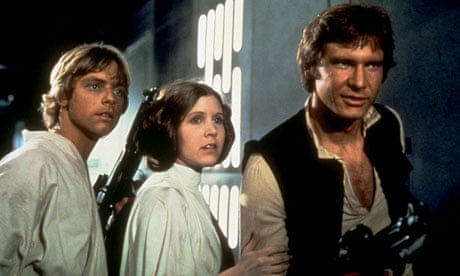
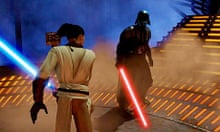
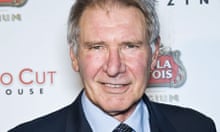
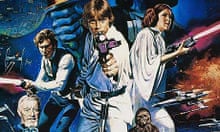

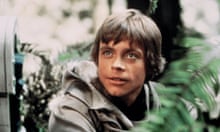

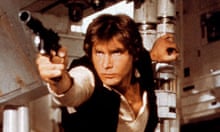
Comments (…)
Sign in or create your Guardian account to join the discussion